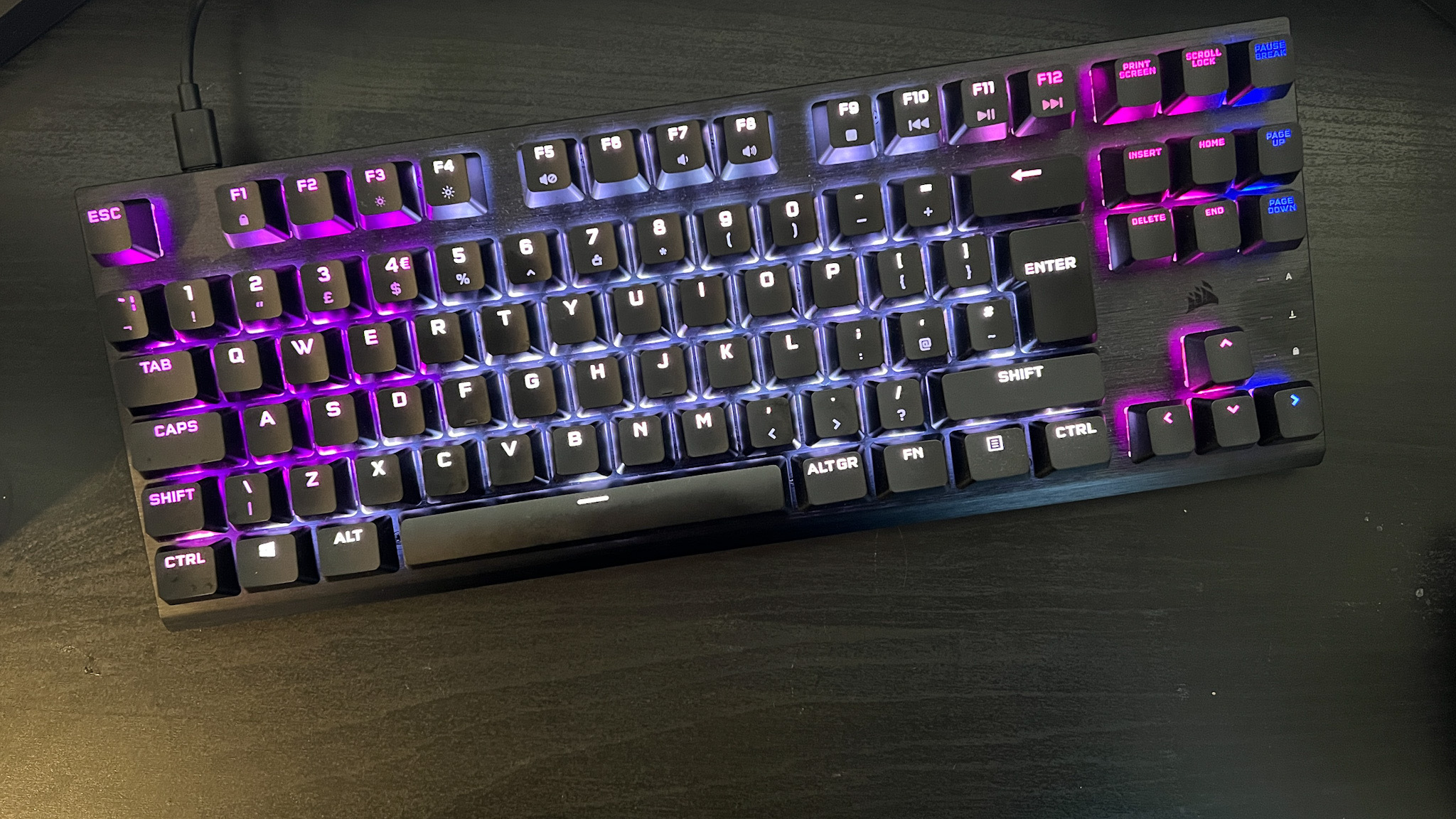GamesRadar+ Verdict
The Corsair K60 Pro TKL is a difficult gaming keyboard to recommend. Those optical mechanical switches will certainly keep you nimble on the battlefield, but slippery keycaps, a cacophony of reverberation, and a clumsy typing experience make this a lightning fast but ultimately graceless deck.
Pros
- +
Smaller bezel design
- +
Super fast switches
- +
Speedy debounce return
Cons
- -
Awful switch feel and sound
- -
Slippery keycaps
- -
Rattly stabilizers
Why you can trust GamesRadar+
The Corsair K60 Pro TKL isn't just a smaller version of the original K60 Pro. With Corsair's OPX optical-mechanical switches, and therefore a greater focus on speed and competitive play, this is a gaming keyboard designed for twitch-reflexes. It does, however, come in at the same $149 MSRP as the K70 Pro TKL (UK players are looking at a £20 saving down to £129 RRP). Unfortunately, the K60 doesn't quite live up to the K70's prowess. The latter is one of the best gaming keyboards on the market right now, while this new model does come with a few shortcomings. Oh, the speed is certainly here, but the overall experience means this isn't going to be a deck for the masses.
| Type | Optical-mechanical |
| Connection | Wired |
| Size | TKL |
| Switches | Corsair OPX Optical-Mechanical |
| Keycaps | ABS |
| Media keys | Dual-function |
| Wrist rest | None |
| USB passthrough | None |
Design
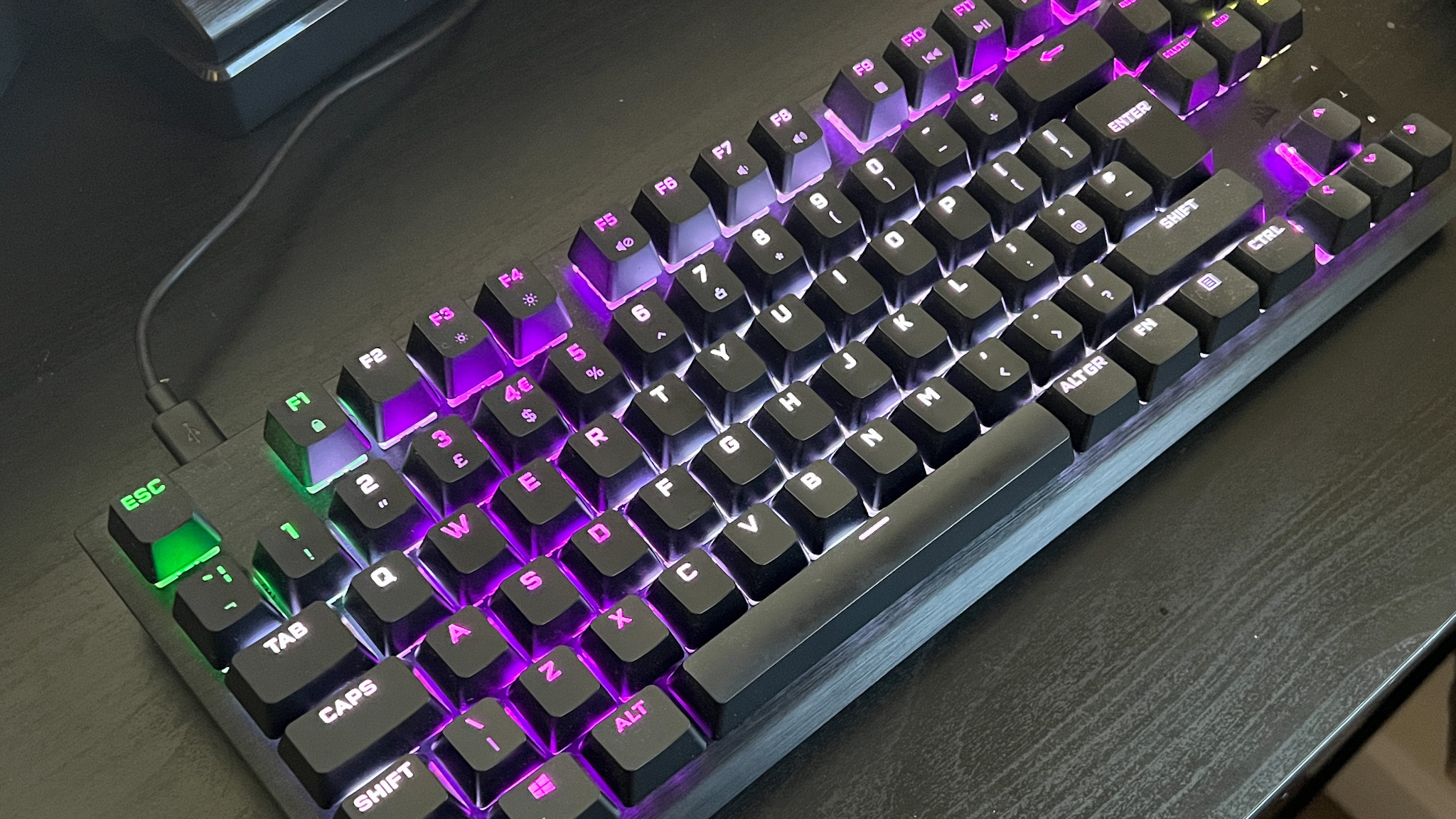
The Corsair K60 Pro TKL follows the design of many keyboards like it. You've got a squat deck with a full function row and arrow and navigation keys, with the classic Corsair legend font and brushed aluminium base plate. Underneath, four rubber pads keep everything in place on your desk and you'll find two small risers for extra elevation. Media controls are relegated to secondary function commands along F5-F12, a fairly standard practice for smaller keyboards but one to watch out for if you tinker with volume or playback a lot.
Corsair has ditched the tall design of its previous decks here, with minimal bezels around the entire deck and a comfortable slope to the bottom edge that holds out well in place of a wrist rest. I much prefer this new approach, there's far less desk space wasted to a logo after all.
In general, then, the K60 Pro TKL offers everything one might expect and looks good while doing so. The main board itself feels high quality despite the plastic base and thinner profile, and the deck remained glued in place during wilder mouse sweeps to the right of it throughout my testing.
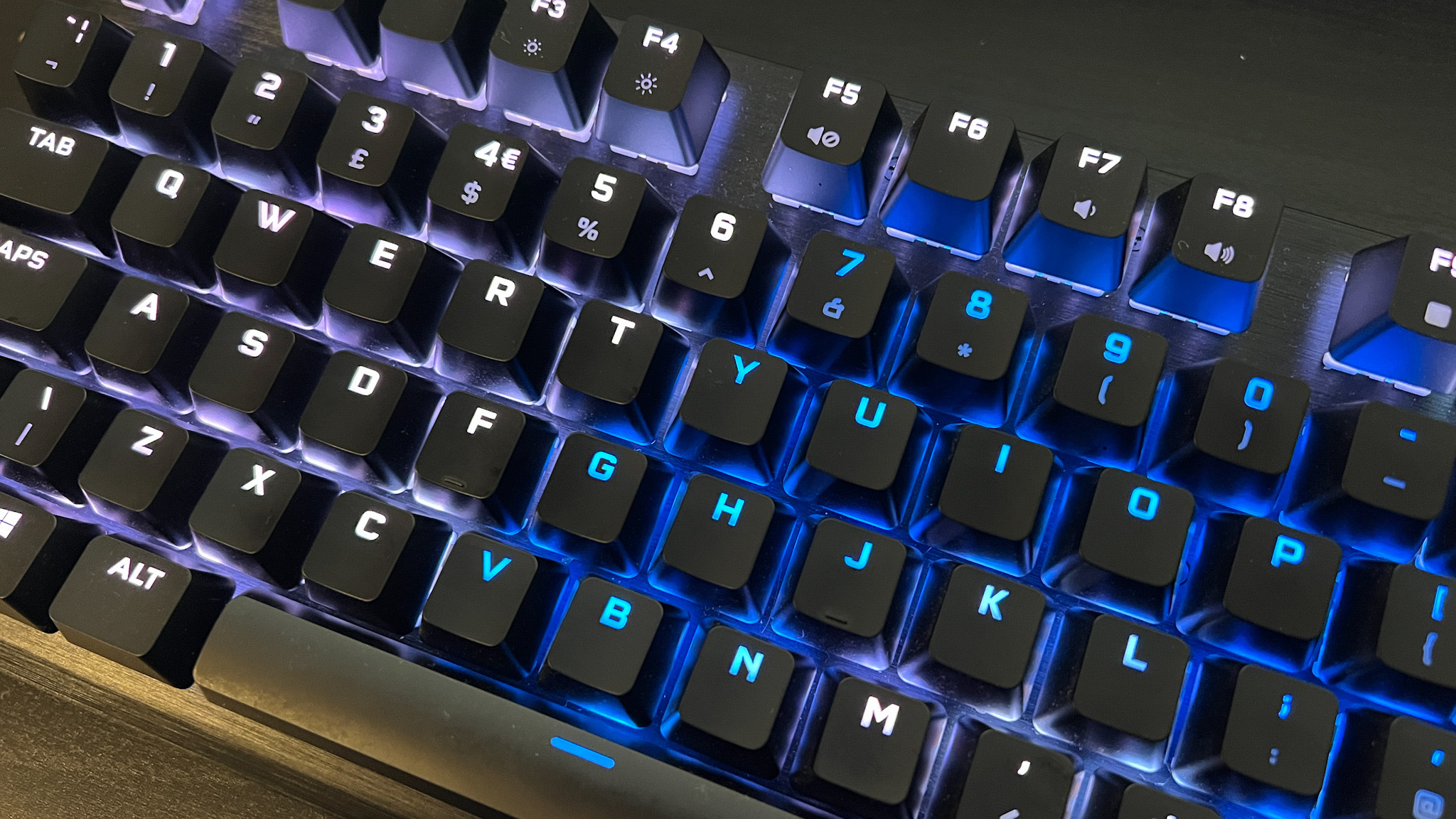
However, those polycarbonate keycaps are back. These smooth caps have no grip to them aside from the legends, and feel far cheaper under your hands than others like them, even including budget ABS models. At over $100 / £100, I was expecting something a little more premium here, these are lightweight dust magnets with a flimsy feel to each key press. That's not all on the caps (there are some switch problems here that we'll get into later), but it's disappointing to see Corsair sticking with lower-quality caps.
Through those disappointing clickers, though, you'll find bright, bold RGB lighting with plenty of different settings and a solid color range as well.
Features
Corsair's OPX Optical Mechanical switches are the main drive behind the K60 Pro TKL. The linear-style, infrared-powered switch boasts no debounce delay and a super fast response thanks to the 1mm actuation point. That's excellent news if you're a competitive player looking to keep those repeat presses snappy and responsive no matter how intense the gameplay is. These things can hold up.
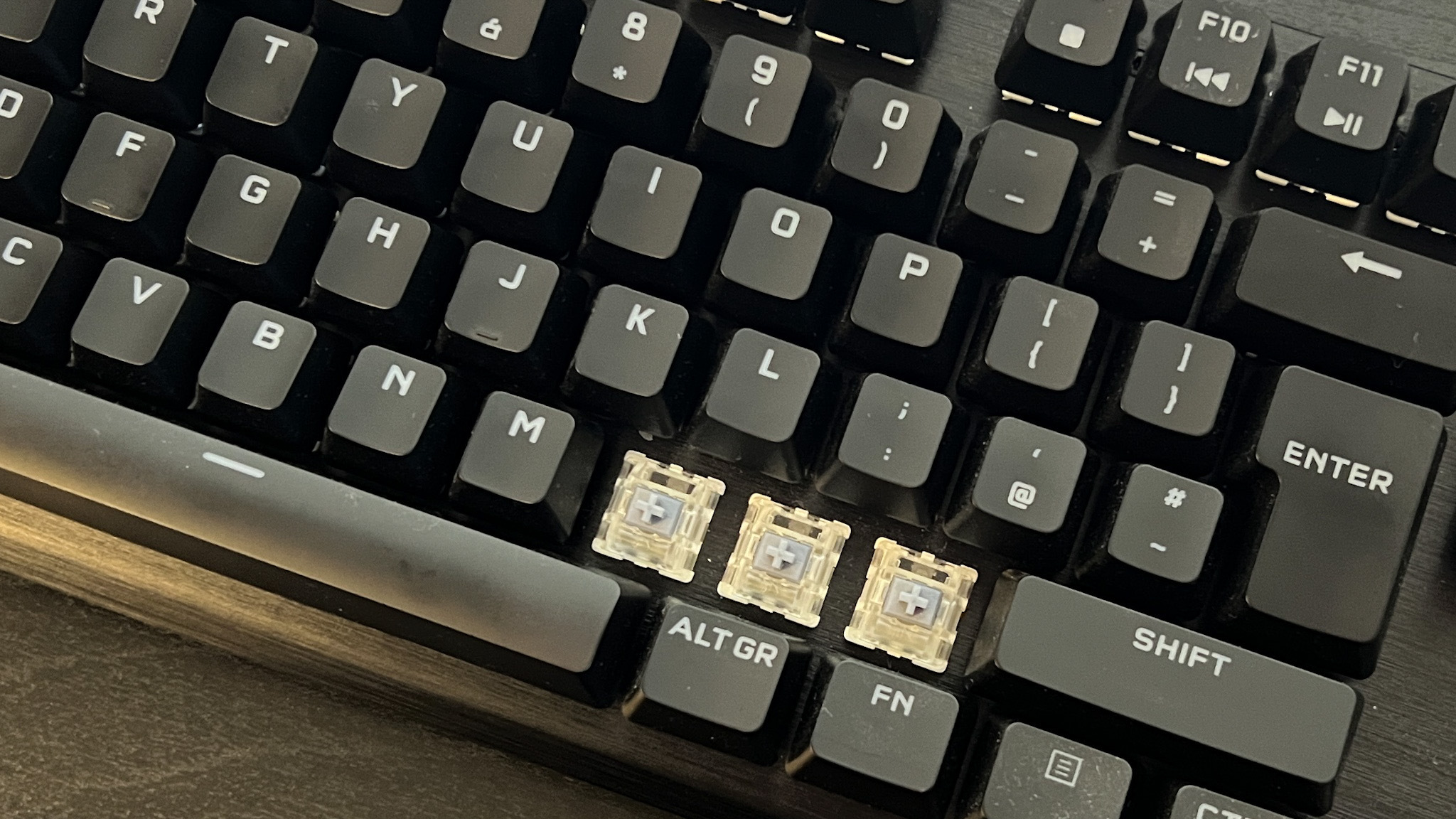
To ensure your keyboard keeps up with those switches, Corsair has packed the K60 Pro TKL with 8K Hz hyper-polling to ensure keypresses are communicated as quickly as possible. That's a nice feature to rest on, but in general you'll never need more than 1K - in my testing, this spec feels more like a gimmick than anything to base a purchase decision around. That is unless you're in a particularly high-level competitive arena.
The Corsair iCUE software does still feel basic compared to alternative brands on the market, but gets the job done by allowing you to reprogram your keys, set per-key RGB lighting, change your polling rate, create presets, and save them to your onboard memory, and update firmware. Those are all standard features one would expect from a $100+ keyboard, but it's also worth noting that the K60 Pro TKL can match its RGB LEDs to your in-game status. I mainly used this feature for low health alerts and it functions nicely with certain titles but is a little finnicky to set up.
So what's missing? Not much. You are dropping the tournament switch and macro support of the Corsair K70 RGB Pro and hot-swappability of the Corsair K70 Pro Mini but both of those models do carry the additional prices to match.
Performance
The Corsair K60 Pro TKL is a speed demon, but it falls into the same trap as many of this brand's decks. I can confirm, these are lightning-fast switches that also manage to maintain a solid point of sensitivity to avoid accidental key presses, but the overall typing experience is pretty darn awful. Yes, I was able to just nudge over my average typing speed with a 91WPM average result on the K60, but accuracy took a hit down to 94% here.
There's no padding underneath those particularly loud, slightly heavy, switches, which means every keypress reverberates across the entire chassis. That's pretty torturous for the ears, but the fingertips don't get away lightly either. There are some particularly rattly stabilizers employed here, and a scratchy, labored feel to each press. Add in those slippery keycaps, and the slightly wider spacing of these keys (compared to the majority of other models I've had my hands on), and things go from annoying to uncomfortable.
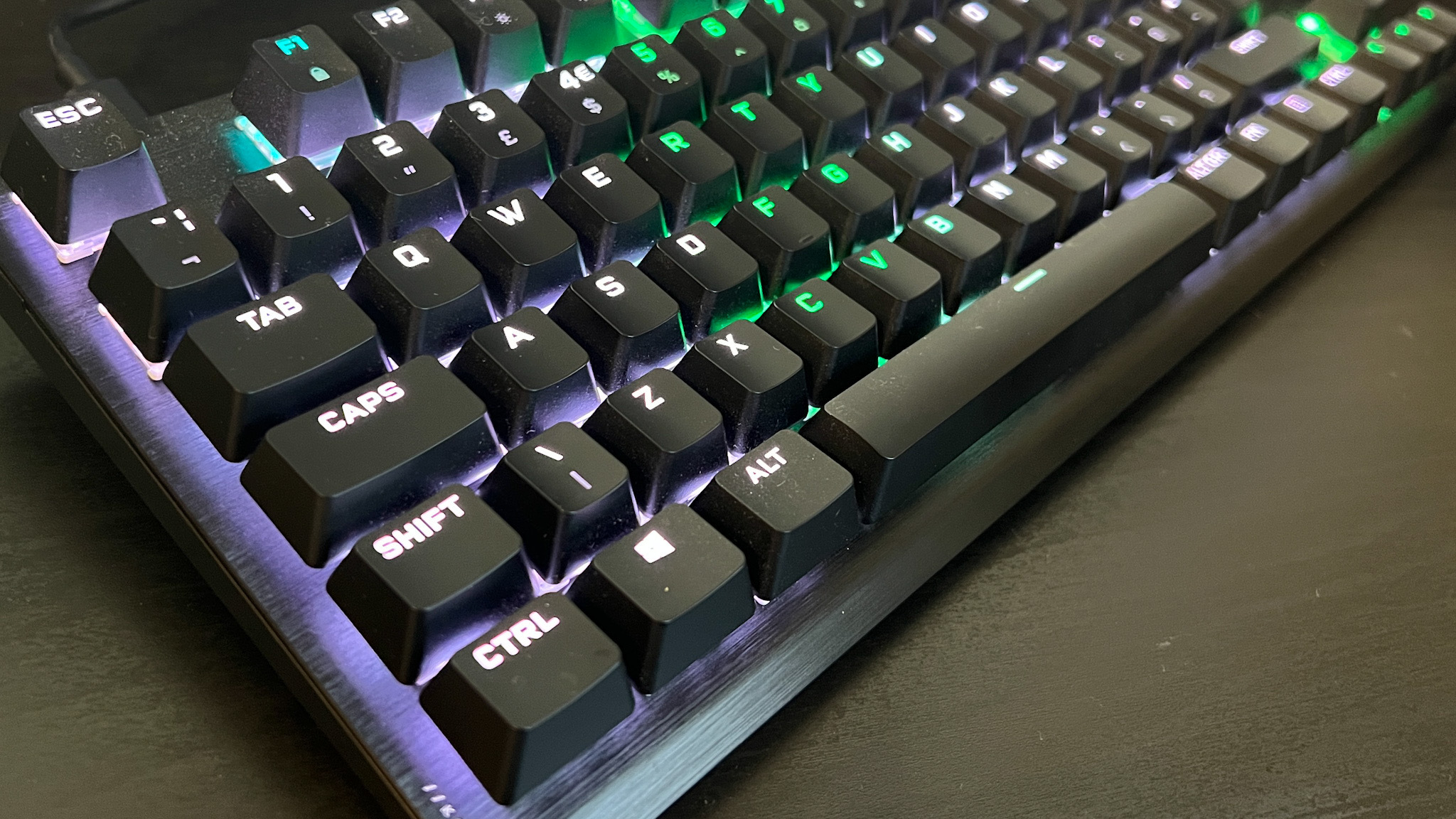
Using this device for work over the course of one week, I'm itching to move on to the next unit, even just to give the ears a break. However, the upsides to the K60 Pro TKL did make themselves known during gameplay. For their sins, the OPX switches really do perform under pressure, offering snappy gameplay across Apex Legends and even slower titles like Yooka Laylee and Submerged: Hidden Depths. I never made too much use of the 8K hyperpolling on offer, keeping things at 1K offered plenty of speed for my everyday use.
If you're purely using your keyboard for gaming, and you need your twitch reactions to be recorded as quickly as possible there's certainly a good amount of value here. However, the vast majority of players will likely find the sound and overall feel of this experience too frustrating to make for a comfortable experience over longer sessions.
Should you buy the Corsair K60 Pro TKL?
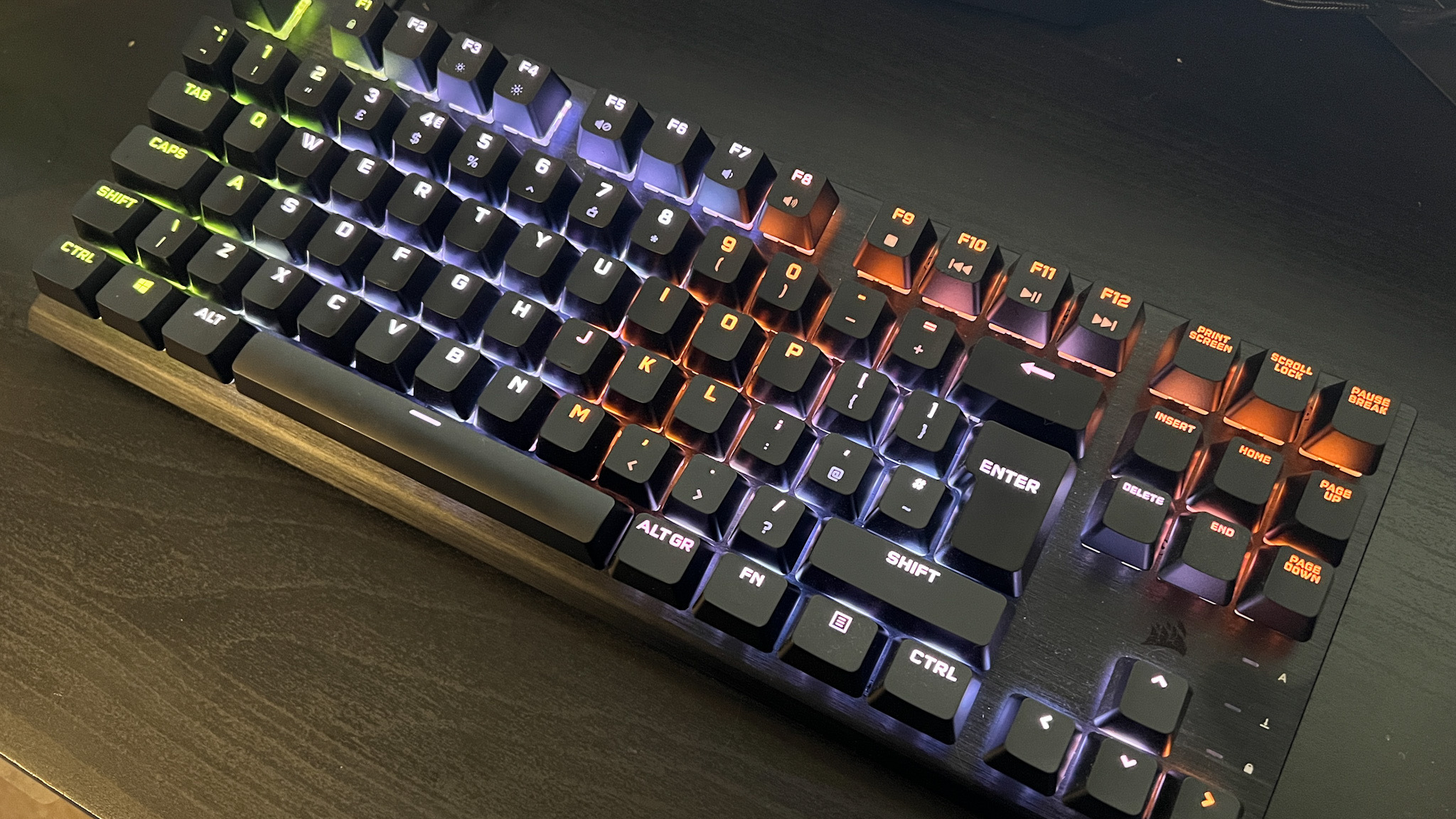
The Corsair K60 Pro TKL is a hard recommendation to make. Competitive players after high-octane reflex keypresses (and who don't need a particularly endurable typing experience) will certainly benefit from the OPX switches and the lightning-fast debounce recovery they provide. However, that's likely the extent of the K60 Pro TKL's market. In reality, the vast majority of players will also be after an everyday typing deck and this really isn't it. The sound, feel, and accuracy of the K60 Pro have all missed the mark here, which is particularly concerning with the Corsair K70 RGB TKL coming in at the same price.
Here, you'll find Cherry MX switches (which will be a little slower, but still plenty responsive), grippier PBT keycaps, and dedicated media controls. You're reverting back to that larger design here, to make room for a volume wheel and extra playback options, but unless you're set on a slimline footprint that shouldn't be too much of a sacrifice for the extra quality of life features.
However, if you're after something a little cheaper, the Razer BlackWidow V3 TKL offers up a far better typing experience, even with ABS keycaps at the forefront. With a smoother set of Razer switches and a sleek design, this is an excellent option for those who don't need quite so much speed and don't want to break past $100 / £100.
On the other hand, the Logitech G715 TKL is a much more comfortable gaming keyboard overall; the Logitech GX switches feel great, you've got wired and wireless connection options, PBT doubleshot keycaps, and a wrist rest included in the box. Those extra features will cost you around $50 / £50 more than the K60, but they're well worth it for the boosted typing experience.
| Row 0 - Cell 0 | Corsair K60 Pro TKL | Corsair K70 TKL | Razer BlackWidow V3 TKL | Logitech G715 TKL |
| Price | $149.99 / £129.99 | $149.99 / £149.99 | $99.99 / £99.99 | $199.99 / £179.99 |
| Type | Optical-mechanical | Mechanical | Mechanical | Mechanical |
| Connection | Wired | Wired | Wired | Wired / Wireless |
| Size | TKL | TKL | TKL | TKL |
| Switches | Corsair OPX Optical-Mechanical | Cherry MX | Razer Green / Razer Yellow | Logitech GX Linear / Clicky / Tactile |
| Keycaps | Polycarbonate | PBT doubleshot | ABS doubleshot | PBT doubleshot |
| Media keys | Dual-function | Dedicated | Dual-function | Dedicated |
| Wrist rest | None | None | None | Yes |
| USB passthrough | None | None | None | None |
How we tested the Corsair K60 Pro TKL
I used the Corsair K60 Pro TKL off and on over the course of two months. During that time I dedicated one week of full-time work to the deck, and two weeks of PC gaming. During that time, I used Yooka Laylee and Submerged: Hidden Depths in everyday play, while stress testing with Epistory and Apex Legends. I also completed typing speed tests using TypingTest.com, recording an average speed over the course of ten two-minute tests.
For more information on how we test gaming keyboards, be sure to check out our full GamesRadar+ Hardware Policy.
For more options, be sure to check out the best Razer keyboards and the best wireless gaming keyboards as well. We're also rounding up the best hot-swappable keyboards for those after more customization options, and plenty of the best membrane keyboards if you're running a smaller budget.

Managing Editor of Hardware at GamesRadar+, I originally landed in hardware at our sister site TechRadar before moving over to GamesRadar. In between, I've written for Tom’s Guide, Wireframe, The Indie Game Website and That Video Game Blog, covering everything from the PS5 launch to the Apple Pencil. Now, i'm focused on Nintendo Switch, gaming laptops (and the keyboards, headsets and mice that come with them), PS5, and trying to find the perfect projector.
